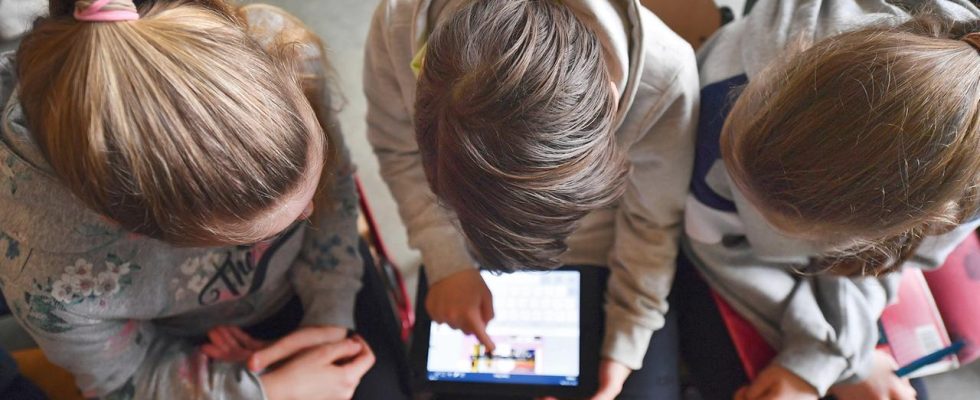exclusive
Germany’s official youth protection filter sometimes prevents websites with educational content from being accessed. This also applies to offers from public bodies, such as research from BR Data and netzpolitik.org show.
“Unfortunately, you cannot view this website. The recommended minimum age for this site is 18 years.” Until recently, anyone who wanted to access the website meincomingout.de was sometimes stopped by this message. The reason: an activated youth protection filter from JusProg, which blocks websites for children and young people depending on their age. meincomingout.de is an offer from Deutsche Aidshilfe. People tell their personal stories there, it’s about trans people, gays and lesbians, worries about the future and the courage to come out.
The Aidshilfe website is no exception. A research by BR Data and netzpolitik.org shows that in at least 70 cases JusProg has classified publicly funded or non-profit information offerings as unsuitable for children and young people, even if they are specifically aimed at young people.
Created for research BR and Netzpolitik.org a sample of more than 150 search queries on Google on sensitive topics that minors could ask. For example: “Use a condom”, “Bulimia help” or “Coming out tips”. The journalists asked some of the affected website operators: None of them knew that they were being blocked by the youth protection program.
The only officially recognized one Youth protection program
The youth protection program JusProg is the only youth protection program for websites that is recognized in Germany according to legal requirements. Parents can install the software on their children’s devices or home network to protect them from age-inappropriate content on the Internet. This means that websites with pornography or violence are not displayed.
The program is developed by the association of the same name, JusProg eV, an association of communications providers such as Vodafone, ProSiebenSat.1 and Freenet, but also from the entertainment and erotic industry, in order to operate their offerings in a legally compliant manner.
JusProg lowered a number of websites following a request from BR and netzpolitik.org the age assessment so that they are accessible to young people again, and admitted that in some cases there is “overblocking”, i.e. pages suitable for a certain age are incorrectly blocked.
Technically, it is a particular challenge, especially in areas such as education and some health topics, to automatically classify websites correctly by age, as these necessarily contain words and word combinations that also occur on problematic websites, said chairman Stefan Schellenberg upon request. That’s why websites are checked manually. He refers to “millions of correctly classified websites,” including hundreds “from sensitive subject areas.”
JusProg classifies websites into age groups
In the spirit of voluntary self-regulation, according to the JusProg website, providers should store technically readable age indicators (Age-de.xml standard) and thus provide information about the age from which the content is suitable. In the from BR However, the sample examined by netzpolitik.org and netzpolitik.org was rarely used.
That’s why JusProg sorts websites according to its own information into age groups: “from 0 years”, “from 6 years”, “from 12 years”, “from 16 years” and “from 18 years”. For this age classification, the program relies on a combination of automatic procedures and human assessments. Upon request from BR and netzpolitik.org, JusProg explains that they use algorithms that automatically evaluate websites based on words.
According to JusProg, people check the age assessment especially on websites that are visited very frequently or when the club receives complaints about incorrect assessments. According to JusProg, a seven-digit number of websites have now been checked manually.
Filter also active in public BayernWLAN
Adults may also find themselves unable to access websites because JusProg requires them to be at least 18 years old. For example, when you dial into one of the more than 44,000 hotspots of BayernWLAN, the public WLAN network financed by the Free State of Bavaria. The WLAN is technically operated by the telecommunications provider Vodafone.
The Bavarian Ministry of Finance, which is responsible for BayernWLAN, announced at the request of BR and netzpolitik.org with: “The ministry has no influence on the functioning of the youth protection filter used by Vodafone.”
For the operator Vodafone, there is no alternative to a youth protection filter: Otherwise, “children and young people who use the WLAN would also be exposed to content on the Internet that is extremely detrimental to their development,” writes the company’s youth protection officer, Melanie Endemann, who is also a member of the board of JusProg, upon request . The JusProg association is solely responsible for the filter list.
Youth protector: Filters can support
Nina Börner, speaker for youth media protection at Aktion Jugendschutz Bayern, says about JusProg’s filter software: Such programs could be helpful, especially for younger children, because “it’s not possible to sit next to me 24/7 when my child uses digital media.” . But filters aren’t everything. “The most important thing is that young people and children are empowered to use the Internet at an early age.” Children would have to learn how to behave there and who they can turn to.
JusProg now wants to improve the automated system for age rating of websites and writes at the request of BR and netzpolitik.org: “We took your test results as an opportunity to identify some potential for improvement, which we will now address.” Now consider some of the latest LGBTIAQ+ abbreviations.
This research was carried out in collaboration with Sebastian Meineck from netzpolitik.org. The research was made possible by technical preparatory work by IT security expert Lilith Wittmann.
Julia Barthel, BR, tagesschau, January 16, 2024 5:27 a.m

